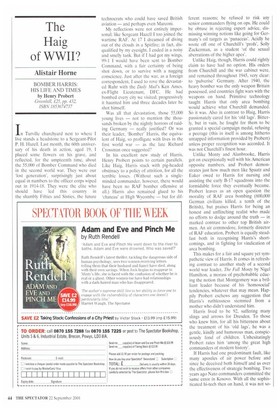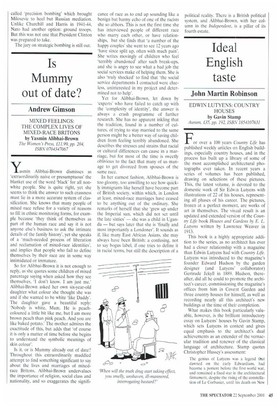The Haig of WWII?
Alistair Horne
BOMBER HARRIS: HIS LIFE AND TIMES by Henry Probert Greenhill. £25, pp. 432 ISBN 1853674737
In Turville churchyard next to where I live stands a headstone to a Sergeant-Pilot P. H. Hazel]. Last month, the 60th anniversary of his death in action, aged 19, I placed some flowers on his grave, and reflected, for the umpteenth time, about the 55,000 of Bomber Command who died in the second world war. They were our 'lost generation', surprisingly just about equal in numbers to the officer corps wiped out in 1914-18. They were the elite who should have led this country in the shambly Fifties and Sixties, the future
technocrats who could have saved British aviation — and perhaps even Marconi.
My reflections were not entirely impersonal; like Sergeant Hazel' I too joined the wartime RAF. At 17 I dreamed of diving out of the clouds in a Spitfire; in fact, disqualified by my eyesight. I ended in a noisy and smelly tank. But if I had got my wings, 99-1 I would have been sent to Bomber Command, with a fair certainty of being shot down, or to survive with a nagging conscience. Just after the war, as a foreign correspondent, I used to rove the devastated Ruhr with the Daily Mail's Ken Ames, ex-Flight Lieutenant, DFC. He had bombed every city we visited; progressively it haunted him and three decades later he shot himself.
Was all that devastation, those 55,000 young lives — not to mention the thousands broken by the nightly horrors of raiding Germany — really justified? Or was their leader, 'Bomber' Harris, the equivalent of Haig, so profligate with lives in the first world war — as the late Richard Crossman once suggested?
In his excellent new study of Harris, Henry Probert points to certain parallels. Like Haig, Harris stuck with pig-headed obstinacy to a policy of attrition, for all the terrible losses. (Without such a singleminded commander, however, there would have been no RAF bomber offensive at all.) Harris also remained glued to his 'chateau' at High Wycombe — but for dif
ferent reasons; he refused to risk any senior commanders flying on ops. He could be obtuse in rejecting expert advice, dismissing winning notions like going for Germany's oil targets as 'panaceas'. Acidly he wrote off one of Churchill's 'profs', Solly Zuckerman, as a student 'of the sexual aberrations of the higher apes-.
Unlike Haig, though, Harris could rightly claim to have had no option. His orders from Churchill and the war cabinet were, and remained throughout 1945, very clear: to 'pulverise' Germany. After 1940, the heavy bomber was the only weapon Britain possessed, and countries fight wars with the weapons on hand. Primitive technology taught Harris that only area bombing would achieve what Churchill demanded. So it was. Also in contrast to Haig, Harris passionately cared for his 'old lags'. Bitterly, but in vain, he fought for them to be granted a special campaign medal, refusing a peerage (this in itself is among hitherto untapped information provided by Probert) unless proper recognition was accorded. It was not Churchill's finest hour.
Unlike Monty and Alanbrooke, Harris got on exceptionally well with his American opposite numbers. and Probert demonstrates just how much men like Spaatz and Eaker owed to Harris for nursing and assisting the early B-17 squadrons into the formidable force they eventually became. Probert leaves as an open question the morality of RAF area bombing (600,000 German civilians killed, a tenth of the British), but praises Harris for being an honest and unflinching realist who made no efforts to dodge around the truth — in marked contrast to other top British airmen. An air commodore, formerly director of RAF education, Probert is equally steadfast both in recognising Harris's shortcomings, and in fighting for vindication of area bombing.
This makes for a fair and square yet sympathetic view of Harris. It comes in refreshing contrast to another study of a second world war leader. The Full Monty by Nigel Hamilton, a morass of psychobabble educing the notion that Montgomery was a brilliant leader because of his 'homosocial' tendencies, whatever that may mean. Happily Probert eschews any suggestion that Harris's ruthlessness stemmed from a mother who didn't understand him.
Harris lived to be 92, suffering many slings and arrows for Dresden. To those who knew him, for all his bitterness about the treatment of his 'old lags', he was a gentle, kindly and humorous man, conspicuously fond of children. Unhesitatingly Probert rates him 'among the great high commanders of modern history'.
If Harris had one predominant fault, like many apostles of air power before and since he deceived both himself and us over the effectiveness of strategic bombing. Two years ago Nato commanders committed the same error in Kosovo. With all the sophisticated hi-tech then on hand, it was not so
called -precision bombing' which brought Milosevic to heel but Russian mediation. Unlike Churchill and Harris in 1941-44, Nato had another option: ground troops. But this was not one that President Clinton was prepared to take.
The jury on strategic bombing is still out.











































































 Previous page
Previous page